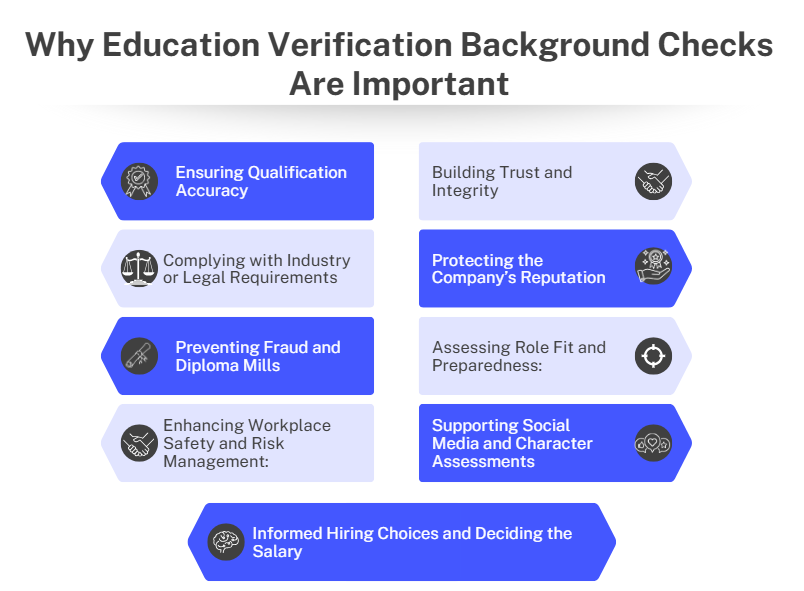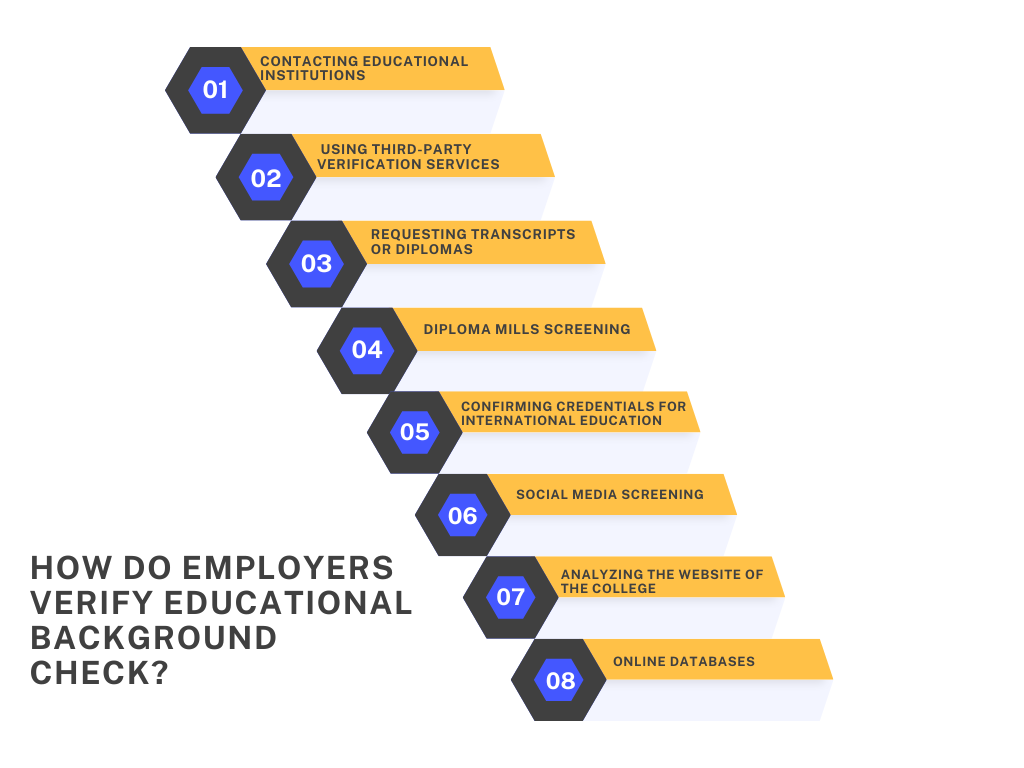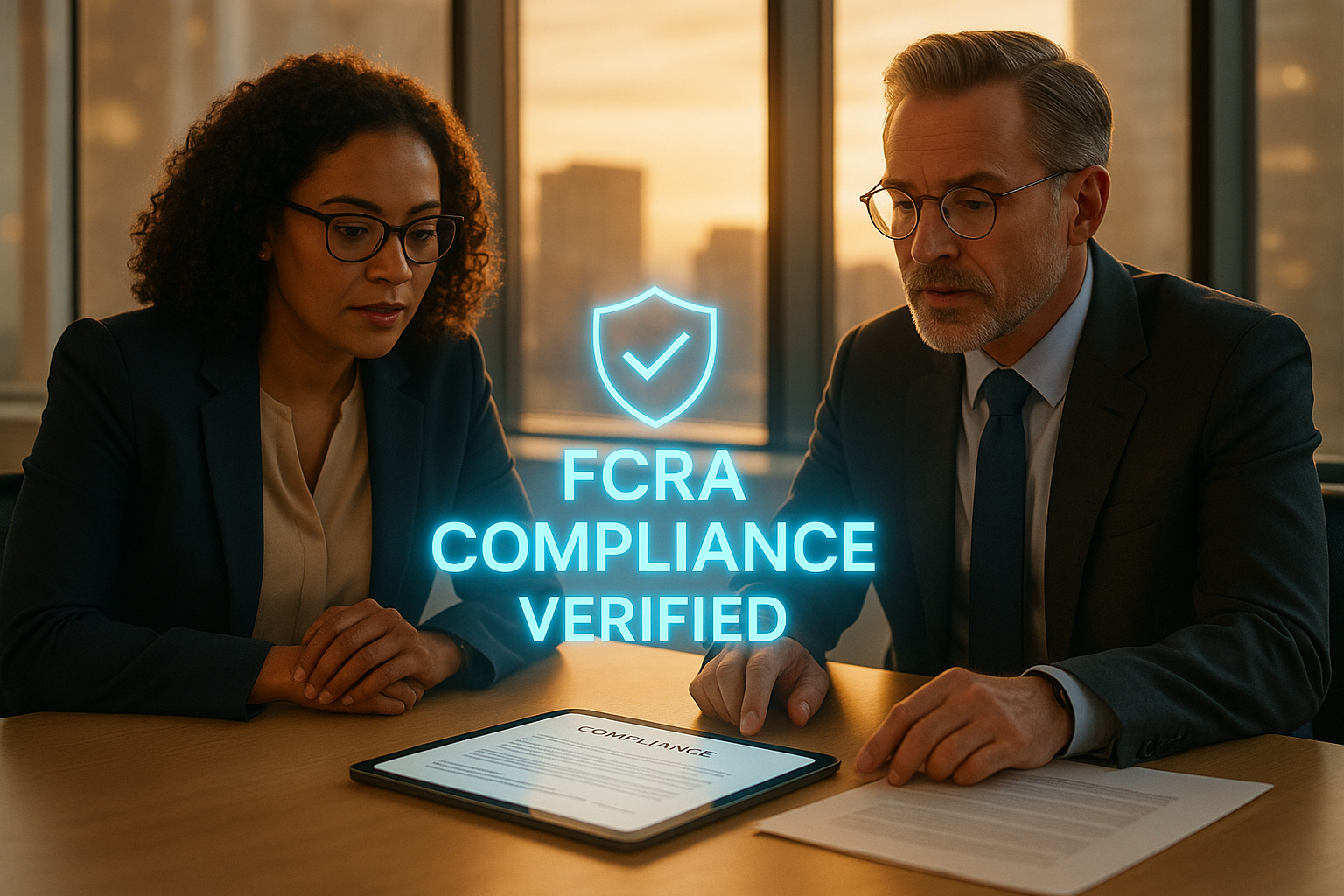How Do Employers Verify Education Background?

Education verification is an important step in the hiring process. Many employers want to know if candidates have the educational qualifications they claim to have. This article explains how employers verify education and why it is essential for making informed hiring decisions.
Background checks usually verify whether a candidate received a post-high school academic degree from an educational institution. Employers often want to confirm the details of a candidate's education history before making an offer.
For more information about the importance of background checks, read our comprehensive guide on background check. Implementing effective verification processes can also help reduce hiring bias in your organization. To learn more about educational verification methods, check out our dedicated section to Verify Education.
What is Education Verification?

Education verification is a type of background checks performed before a candidate is hired, typically after a conditional offer of employment is extended. It may confirm a candidate's date of attendance at a particular educational institution and/or receipt of a particular degree.Employers check degrees to ensure that candidates possess the educational qualifications they claim, including confirming the levels of college degrees the candidate has achieved.
Employers look into various aspects of education verification, including:
- Dates of Attendance: This confirms when the candidate was enrolled.
- Degrees Obtained: Employers verify whether the applicant earned the degrees they claim to hold.
- Institution Accreditation: This checks if the educational institution is recognized and accredited.

Education background checks are important for several reasons:
- Ensuring Qualification Accuracy: Employers need to confirm that candidates have the qualifications they say they do, which may include professional license verification when relevant.
- Building Trust and Integrity: Verification helps build a trustworthy relationship between employer and employee.
- Complying with Industry or Legal Requirements: Some industries require strict education verification to meet regulations.
- Protecting the Company’s Reputation: Hiring qualified candidates helps maintain the company’s good reputation.
- Preventing Fraud and Diploma Mills: Checking educational backgrounds can prevent hiring individuals with fake degrees.
- Assessing Role Fit and Preparedness: A candidate’s education can indicate their readiness for a role.
- Enhancing Workplace Safety and Risk Management: Education verification contributes to safer work environments.
- Supporting Social Media and Character Assessments: Employers often review a candidate’s social media in tandem with educational verification.
- Informed Hiring Choices and Deciding the Salary: Accurate education verification aids in making fair hiring decisions. Candidates should also know how to properly List Education on a Resume, ensuring clarity for potential employers.
How Do Employers Verify Educational Background Check?

Employers typically use three main methods to verify educational backgrounds: they may contact the educational institutions directly, request a copy of the candidate's diploma or transcripts, or work with a third-party background check service.
1. Contacting Educational Institutions
Employers can directly contact the educational institutions a candidate claims to have attended. This method ensures that they get accurate information. Employers often ask for:
- Confirmation of enrollment dates
- Degree earned
- Any honors received
To verify educational institutions, employers can call or email the admissions office or registrar’s office.
2. Using Third-Party Verification Services
Many employers choose to work with third-party services that specialize in education verification. These companies have the resources and expertise to quickly and efficiently verify education. They can often provide a comprehensive report that includes:
- Degree confirmation
- Verification of the institution's accreditation
3. Requesting Transcripts or Diplomas
Employers may ask candidates to submit their transcripts or diplomas as part of the verification process. This provides a quick way to confirm the education claimed. However, this method relies on the honesty of the candidate.
4. Online Databases
Some organizations maintain online databases where employers can verify degrees and education claims. These databases can streamline the process of verification.
5. Diploma Mills Screening
Employers must be cautious of diploma mills—schools that offer degrees with little or no academic requirements. Background checks help identify and avoid hiring from these institutions.
6. Confirming Credentials for International Education
For candidates with degrees from international institutions, employers may need additional verification methods. They might check with international databases or use services that specialize in international education verification.
7. Social Media Screening
Employers can also use social media screening as a complementary method to verify education claims. Candidates often share their educational backgrounds on platforms like LinkedIn.
8. Analyzing the Website of the College
Checking the official website of the claimed educational institution can also provide insights into its legitimacy. Employers can look for accreditation details and program offerings.
By leveraging these methods, employers can make informed decisions in the hiring process, especially for roles requiring specific Higher Education qualifications.
When Do Employers Check Educational Background?
Employers usually verify educational backgrounds once a conditional job offer has been extended. This process indicates that a candidate has been selected but must complete specific checks before final employment. It enables employers to validate educational claims without significantly delaying the hiring process.
Many employers perform education verifications as part of the hiring process. Confirming a candidate's educational history ensures that the information they provided is accurate, allowing you to feel confident when making a job offer.
Why Employers Need Education Background Checks?
Here are some key reasons why employers conduct education background checks:
- Ensuring Qualification Accuracy: To make sure candidates have the right qualifications.
- Building Trust and Integrity: To promote honesty in the hiring process.
- Complying with Industry or Legal Requirements: Some jobs require strict educational qualifications.
- Protecting the Company’s Reputation: To avoid hiring unqualified candidates.
- Preventing Fraud and Diploma Mills: To avoid scams related to education credentials.
- Assessing Role Fit and Preparedness: To determine if candidates are ready for the job.
- Enhancing Workplace Safety and Risk Management: To ensure a safe work environment.
- Supporting Social Media and Character Assessments: To check if a candidate aligns with company values.
- Informed Hiring Choices and Deciding the Salary: To help determine fair compensation based on qualifications.
What Does an Education Background Check Show?
An education background check provides details about a candidate's academic history, including attendance dates, majors, graduation dates, and any degrees or certificates obtained.
In the case of candidates who are graduates, the verification will usually focus on the most recent school attended.
- Degree Confirmation: This includes checking if the degree listed on the resume is valid.
- Institution Name and Accreditation: Employers verify the name of the institution and its accreditation status.
- Dates of Attendance and Graduation: This confirms when the candidate attended and graduated.
- Major or Field of Study: Employers check the major to ensure it aligns with the job requirements.
- Honors and Distinctions: This includes any honors received during their studies.
- Certifications or Licenses Obtained: Verifying additional qualifications that may be relevant to the job.
- Verification of Online Profiles (e.g., LinkedIn): Checking online profiles to confirm the information provided by the candidate.
How to Select an Education Verification Service Provider
When selecting an education verification service provider, keep these key factors in mind:
- Comprehensive and Accurate Reports: Ensure the provider delivers detailed, accurate reports, so you have reliable information for hiring decisions.
- Compliance with Legal Standards: Verify that the service adheres to regulations like Ban the Box Laws, Equal Employment Opportunity Commission (EEOC) guidelines, and the Fair Credit Reporting Act. This ensures your company remains compliant.
- Industry Experience and Reputation: Opt for a provider with solid experience and a good reputation in the background verification industry.
- Data Protection and Privacy: Confirm that the provider uses strong security measures to protect sensitive data.
- International Verification Capabilities: If you’re hiring candidates with international education, select a provider experienced in global verification processes.
- Clear Reporting and Communication: Effective communication and transparent reporting are crucial for seamless information flow.
- Transparent Pricing: Understand the pricing structure and what’s included in the service to avoid unexpected costs.
- Customer Support: Look for a provider with reliable customer service to assist with any issues or questions promptly.
- Quick Turnaround Times: Evaluate the provider’s processing speed to minimize delays in the hiring process.
Additionally, ensure that the service provider can support compliance with the Adverse Action Process and the Fair Chance to Compete for Jobs.
Education Background Check Verification - Frequently Asked Questions
1- Do College Degrees Show Up on Background Checks?
Background checks are now a common step for employers when evaluating potential candidates. A significant part of these checks involves verifying an individual's educational background, where employers seek confirmation of degrees earned and attendance at the institutions listed by the candidate.
2- How Far Back Do Education Background Checks Go?
The federal Fair Credit Reporting Act (FCRA) limits the lookback period for various types of background checks, including criminal record screenings. However, there are no such restrictions on education verification screenings. Employers can verify all educational claims, regardless of when they occurred.
3- How Long Does Education Verification Take?
The duration for education verification can vary based on the methods used. Generally, it can take anywhere from a few days to several weeks. Factors affecting the time include the responsiveness of the institutions being contacted and the thoroughness of the verification service. For more information on this topic, check our article on the background check timeframe.
4- Do Employers Verify Education Degrees?
Yes, most employers verify education degrees as part of their hiring process. This helps ensure candidates have the qualifications they claim.
5- Is GPA Included in an Education Verification Background Check?
Typically, GPA is not included in standard education verification checks. Employers may ask for this information directly from candidates if it's important for the position.
6- How Can Employers Check International Education Backgrounds?
Employers can check international education backgrounds through third-party services that specialize in this area or by contacting the institutions directly. They may also consult databases that contain international education credentials.
7- How Do I Spot a Fake Degree on My Applicant's Resume?
To identify potential red flags in a background check, review the institution's accreditation status and look for inconsistencies in the candidate’s education claims. Checking references and utilizing third-party services can also aid in spotting fake degrees.
8- Do college degrees show up on background checks?
Yes, college degrees typically show up on background checks. An education background check verifies if the applicant attended the schools they assert, confirms the degrees, training, and certifications obtained, and checks the dates of attendance.
These checks confirm whether an applicant attended the institutions they claimed, as well as verify the degrees, training, and certifications they hold, along with the dates of attendance. Employers often conduct education verification as part of the hiring process to ensure the accuracy of the information provided by candidates.
9- How to Find Out if Someone is Lying About Their Degree
To determine if someone is lying about their educational qualifications, begin by conducting a background check through a reputable service that includes education verification. You can also contact the educational institutions directly, as registrars can confirm enrollment and degrees. Requesting official transcripts from the candidate is another effective method.
Verify the accreditation status of the institution, which can typically be found on its website or through the Department of Education. Utilize online resources and databases specializing in degree verification, and review the candidate's social media profiles for context.
10- What Legal Restrictions Are Related to Education Verification?
Education verification is subject to various legal restrictions to promote fairness in hiring. The Fair Credit Reporting Act (FCRA) mandates that employers obtain consent from candidates before conducting background checks and inform them if adverse actions arise from the findings.
Equal Employment Opportunity Commission (EEOC) guidelines require that these checks do not disproportionately affect specific demographic groups. Ban the Box laws restrict inquiries about criminal history on applications, which can also influence the scrutiny of education claims.
In conclusion, education verification is a crucial step for employers in the hiring process. By thoroughly checking a candidate’s educational background, employers can make informed decisions that contribute to the overall success of their organization.






